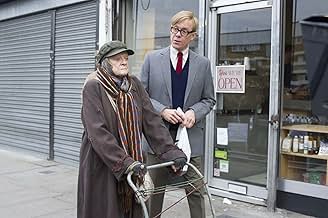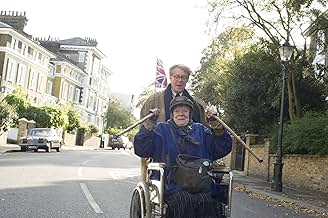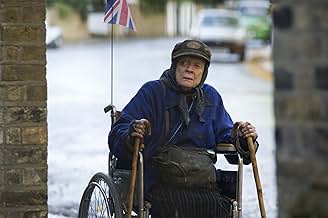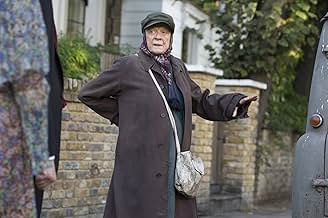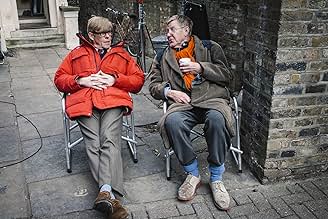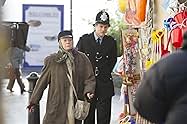AVALIAÇÃO DA IMDb
6,7/10
34 mil
SUA AVALIAÇÃO
Um homem forma um vínculo inesperado com uma mulher que mora em uma van.Um homem forma um vínculo inesperado com uma mulher que mora em uma van.Um homem forma um vínculo inesperado com uma mulher que mora em uma van.
- Indicado para 1 prêmio BAFTA
- 1 vitória e 8 indicações no total
Avaliações em destaque
Greetings again from the darkness. "There's air freshener behind the Virgin". That line should provide the necessary caution for you to be braced for just about anything to be said by any character in this latest from director Nicholas Hytner. Billed as "A mostly true story", it's actually more commentary on how we treat those less fortunate and how we use others for our own gain. That bleak message is cloaked here in humor and a wonderful performance from Dame Maggie Smith.
Alan Bennett is an author, playwright and screenwriter known for The History Boys and The Madness of King George (Oscar nominated for his script). He is also at the core of this story – every bit as much as Ms. Shepherd, the lady in the van. While living in upper crust Camden Town, Mr. Bennett offered to let Ms. Shepherd park her van in his driveway for a few weeks until she could make other arrangements. This van was also her home, and the years (as they are apt to do) came and went until this arrangement had lasted 15 years (1974-1989).
You might assume that Ms. Shepherd was an extremely appreciative "squatter", but in fact, she was quite a cantankerous and difficult woman, possibly/probably suffering from mental instability. Maggie Smith brings a humanity to the role that she had previously owned onstage and radio. She goes far deeper than the wise-cracking old lady role we have grown accustomed to seeing her play though her vicious dialogue delivery remains in prime form. Throughout the film, we assemble bits and pieces of Ms. Shepherd's background: an educated-French speaking musician-turned nun-former ambulance driver-who "possibly" won awards for her talents. She is also carrying a burden of guilt from a past tragic accident that keeps her in the confessional on a consistent basis.
Mr. Bennett is played by Alex Jennings (The Queen, 2006), and the film actually presents dual Bennetts – the one doing the writing, and the one doing the living. These two Bennetts are a virtual married couple – arguing over Ms. Shepherd, and jabbing each other with barbs aimed directly at known emotional weaknesses. The living Bennett claims to be so full of British timidity that he couldn't possibly confront the woman junking up his driveway. The writer Bennett takes the high road and claims he would rather write spy stories than focus his pen on the odorous, obnoxious transient living in his front yard. Of course, now that we have a play and movie, it's difficult to avoid viewing Mr. Bennett's actions as anything less than inspiration for his writing though the extended charitable actions cannot be minimized.
With director Hytner and writer Bennett reuniting, it's also interesting to note that more than a dozen actors from The History Boys make appearances here. The list includes James Corden, Frances de la Tour, and Dominic Cooper. Also in supporting roles are Roger Allam and Deborah Findlay (playing constantly irritated neighbors), Gwen Taylor as Bennett's dementia-stricken mother, Jim Broadbent as a blackmailing former cop, and Marion Bailey as a staffer at the abbey.
Filmed at the same house where the van was parked for so many years, the film is a reminder to us to exercise tolerance and charity in dealing with the poor. Even Bennett's grudgingly-offered assistance is a step above what would typically be expected. While we could feel a wide spectrum of emotions for the two main parties here, it's Ms. Shepherd's character who says "I didn't choose. I was chosen". We are left to interpret her words in a way that is either quite sad or accepting.
The film mostly avoids dime store sentimentality, and that's in large part due to Maggie Smith's performance. Few are as effective at frightening young kids or putting the elite in their place. The ending scene shows the real Alan Bennett cruising into the driveway on his bicycle just as the blue plaque honoring the lady in the van is displayed. We can be certain this gesture would not generate a "thank you" from her.
Alan Bennett is an author, playwright and screenwriter known for The History Boys and The Madness of King George (Oscar nominated for his script). He is also at the core of this story – every bit as much as Ms. Shepherd, the lady in the van. While living in upper crust Camden Town, Mr. Bennett offered to let Ms. Shepherd park her van in his driveway for a few weeks until she could make other arrangements. This van was also her home, and the years (as they are apt to do) came and went until this arrangement had lasted 15 years (1974-1989).
You might assume that Ms. Shepherd was an extremely appreciative "squatter", but in fact, she was quite a cantankerous and difficult woman, possibly/probably suffering from mental instability. Maggie Smith brings a humanity to the role that she had previously owned onstage and radio. She goes far deeper than the wise-cracking old lady role we have grown accustomed to seeing her play though her vicious dialogue delivery remains in prime form. Throughout the film, we assemble bits and pieces of Ms. Shepherd's background: an educated-French speaking musician-turned nun-former ambulance driver-who "possibly" won awards for her talents. She is also carrying a burden of guilt from a past tragic accident that keeps her in the confessional on a consistent basis.
Mr. Bennett is played by Alex Jennings (The Queen, 2006), and the film actually presents dual Bennetts – the one doing the writing, and the one doing the living. These two Bennetts are a virtual married couple – arguing over Ms. Shepherd, and jabbing each other with barbs aimed directly at known emotional weaknesses. The living Bennett claims to be so full of British timidity that he couldn't possibly confront the woman junking up his driveway. The writer Bennett takes the high road and claims he would rather write spy stories than focus his pen on the odorous, obnoxious transient living in his front yard. Of course, now that we have a play and movie, it's difficult to avoid viewing Mr. Bennett's actions as anything less than inspiration for his writing though the extended charitable actions cannot be minimized.
With director Hytner and writer Bennett reuniting, it's also interesting to note that more than a dozen actors from The History Boys make appearances here. The list includes James Corden, Frances de la Tour, and Dominic Cooper. Also in supporting roles are Roger Allam and Deborah Findlay (playing constantly irritated neighbors), Gwen Taylor as Bennett's dementia-stricken mother, Jim Broadbent as a blackmailing former cop, and Marion Bailey as a staffer at the abbey.
Filmed at the same house where the van was parked for so many years, the film is a reminder to us to exercise tolerance and charity in dealing with the poor. Even Bennett's grudgingly-offered assistance is a step above what would typically be expected. While we could feel a wide spectrum of emotions for the two main parties here, it's Ms. Shepherd's character who says "I didn't choose. I was chosen". We are left to interpret her words in a way that is either quite sad or accepting.
The film mostly avoids dime store sentimentality, and that's in large part due to Maggie Smith's performance. Few are as effective at frightening young kids or putting the elite in their place. The ending scene shows the real Alan Bennett cruising into the driveway on his bicycle just as the blue plaque honoring the lady in the van is displayed. We can be certain this gesture would not generate a "thank you" from her.
At the bottom of the poster it says: 'This is a mostly true story.' Nicholas Hytner directs a 'revisionist' take on Miss Shepherd, the tramp-like old biddy who parked her van in Alan Bennett's front drive for a few weeks that turned into 15 years. The movie version fleshes out her story with glimpses of her past (a convent, a piano recital, a family feud, a fatal accident) which the narrator (one of the two Alan Bennetts played by Alex Jennings) tells us he only found out after she died.
A woman in front of me whispered to her companion, who wondered why Alan Bennett had a twin, that he actually had a split personality. That's not a bad explanation for the device of the householder Alan who puts up with Miss Shepherd (and clears her mess from his drive) and the writer Alan who doesn't think there's a story in this. I'm not sure that the double-act is entirely effective or necessary: a voice-over from the real Alan would have worked just as well, wouldn't it?
Despite the attempts to give the Lady a life before the Van, the screenplay is more revealing about the playwright, the reluctant Samaritan who is also having to deal with his northern mother's journey down the road to dementia. There are even a few references to the fact that Mr Bennett's sexuality was being questioned for many years before he finally outed himself.
The movie has more pace than the book and the play did. Maggie Smith is of course simply magnificent, fully absorbed into the grimy skin of this unlovable old harridan. Her performance is pitched midway between the Duchess of Downton and Muriel from the Marigold Hotel, although the character preposterously blends Hyacinth Bucket with Victor Meldrew. The 'History Boys', who largely owe their careers to Mr Bennett, pop up in a series of cameos, along with Frances de la Tour and Stephen Campbell-Moore from the same play. Jim Broadbent's scrounger is the least convincing presence and is perhaps mostly untrue.
This looks like being another highly competitive year for Oscars and BAFTAs, but Dame Maggie is certain to be a contender and could well be a winner. THE LADY IN THE VAN is not pitch-perfect in the way that THE HISTORY BOYS was (and the first - best - MARIGOLD HOTEL), but it is another master-class exemplar of British writing, acting and film- making.
A woman in front of me whispered to her companion, who wondered why Alan Bennett had a twin, that he actually had a split personality. That's not a bad explanation for the device of the householder Alan who puts up with Miss Shepherd (and clears her mess from his drive) and the writer Alan who doesn't think there's a story in this. I'm not sure that the double-act is entirely effective or necessary: a voice-over from the real Alan would have worked just as well, wouldn't it?
Despite the attempts to give the Lady a life before the Van, the screenplay is more revealing about the playwright, the reluctant Samaritan who is also having to deal with his northern mother's journey down the road to dementia. There are even a few references to the fact that Mr Bennett's sexuality was being questioned for many years before he finally outed himself.
The movie has more pace than the book and the play did. Maggie Smith is of course simply magnificent, fully absorbed into the grimy skin of this unlovable old harridan. Her performance is pitched midway between the Duchess of Downton and Muriel from the Marigold Hotel, although the character preposterously blends Hyacinth Bucket with Victor Meldrew. The 'History Boys', who largely owe their careers to Mr Bennett, pop up in a series of cameos, along with Frances de la Tour and Stephen Campbell-Moore from the same play. Jim Broadbent's scrounger is the least convincing presence and is perhaps mostly untrue.
This looks like being another highly competitive year for Oscars and BAFTAs, but Dame Maggie is certain to be a contender and could well be a winner. THE LADY IN THE VAN is not pitch-perfect in the way that THE HISTORY BOYS was (and the first - best - MARIGOLD HOTEL), but it is another master-class exemplar of British writing, acting and film- making.
When you see vagrants sleeping rough in doorways it is grimly fascinating to wonder how they got there. Was it a gradual descent due to drink or drugs? Or was it an 'explosive decompression' – an event so dramatic it capsized an otherwise stable existence? In a gripping pre-title sequence, it is the latter that sets up the back-story for Miss Shepherd – the titular "Lady in the Van" played by the marvelous Dame Maggie Smith.
Based on a "mostly true" story, Miss Shepherd lives in an old Bedford van progressing from unwelcome parking space to unwelcome parking space in the well-to-do Gloucester Crescent in Camden (a street that strangely the Google Streetview car has never ventured down!).
This introduces us to a selection of the local residents, including – bizarrely – the wife of composer Ralph Vaughan-Williams (Frances de la Tour). The wily Miss Shepherd can however spot a soft touch from miles away and latches onto the newest resident, famous playwright Alan Bennett played (in multiple concurrent forms) by Alex Jennings (doing a fine impersonation). When yellow-lines necessitate action, Miss Shepherd wheedles her van onto his driveway for "three months": three months that turns into 15 years.
I was in two minds from the trailer as to whether I wanted to see this film or not, and I'm so pleased that I did. What stands out, and what makes it so enjoyable, is the whip-smart and intelligent script by Bennett, based on his memoirs. The use of two Bennetts – one 'doing the writing' and one 'doing the living' – could be considered contrived, but allows the frustrations and inner demons (concerning his ailing mother 'up north') to be given a witty and articulate voice.
Despite getting progressively typecast as a vaguely batty old woman, Dame Maggie excels as the troubled Miss Shepherd – it is difficult to imagine many other actresses being able to pull off this larger than life role any better. When pathos is required (e.g. "Why did you choose to live like this?"; "I didn't choose I was chosen") she delivers it in heart breaking fashion. But her more comic pronouncements, such as the one about the number of "young men" visiting Bennett's house at "every hour of the day and night" obviously being "communists", were hilarious. What appears on the surface to be a mildly humorous movie turned out to have some serious belly-laughs.
Less successful in the film is the normally excellent Jim Broadbent, playing a retired copper with an unhealthy interest in the old lady. While this may have been a true part of the story, it really didn't come across very satisfactorily, and the scenes seem brash and out of kilter with the mood of the rest of the film.
A selection of cameos in the film include Dominic Cooper ("Captain America", "Mamma Mia") and (proving how long this film has been in the can) the now US celebrity presenter James Corden.
The slightly surreal ending of the film, set in a graveyard, might not be to everyone's taste, but I personally enjoyed it and it added to the kookiness of what turned out to be a pretty kooky film.
The film is directed by Nicholas Hytner. Although having a few notable movies to his credit ("The Madness of King George", "The History Boys"), he is better known as a regular director for National Theatre productions in London, and the film does have something of a 'stagy' feel about it. But as an example of a quintessential British film, based on a 'true' subject that seems barely credible, it makes for a heart-warming and highly entertaining trip to the movies. And in this week of the dreadful events in Paris, we could all do with that. Recommended.
(Please visit bob-the-movie-man.com for the graphical version of this review. Thanks).
Based on a "mostly true" story, Miss Shepherd lives in an old Bedford van progressing from unwelcome parking space to unwelcome parking space in the well-to-do Gloucester Crescent in Camden (a street that strangely the Google Streetview car has never ventured down!).
This introduces us to a selection of the local residents, including – bizarrely – the wife of composer Ralph Vaughan-Williams (Frances de la Tour). The wily Miss Shepherd can however spot a soft touch from miles away and latches onto the newest resident, famous playwright Alan Bennett played (in multiple concurrent forms) by Alex Jennings (doing a fine impersonation). When yellow-lines necessitate action, Miss Shepherd wheedles her van onto his driveway for "three months": three months that turns into 15 years.
I was in two minds from the trailer as to whether I wanted to see this film or not, and I'm so pleased that I did. What stands out, and what makes it so enjoyable, is the whip-smart and intelligent script by Bennett, based on his memoirs. The use of two Bennetts – one 'doing the writing' and one 'doing the living' – could be considered contrived, but allows the frustrations and inner demons (concerning his ailing mother 'up north') to be given a witty and articulate voice.
Despite getting progressively typecast as a vaguely batty old woman, Dame Maggie excels as the troubled Miss Shepherd – it is difficult to imagine many other actresses being able to pull off this larger than life role any better. When pathos is required (e.g. "Why did you choose to live like this?"; "I didn't choose I was chosen") she delivers it in heart breaking fashion. But her more comic pronouncements, such as the one about the number of "young men" visiting Bennett's house at "every hour of the day and night" obviously being "communists", were hilarious. What appears on the surface to be a mildly humorous movie turned out to have some serious belly-laughs.
Less successful in the film is the normally excellent Jim Broadbent, playing a retired copper with an unhealthy interest in the old lady. While this may have been a true part of the story, it really didn't come across very satisfactorily, and the scenes seem brash and out of kilter with the mood of the rest of the film.
A selection of cameos in the film include Dominic Cooper ("Captain America", "Mamma Mia") and (proving how long this film has been in the can) the now US celebrity presenter James Corden.
The slightly surreal ending of the film, set in a graveyard, might not be to everyone's taste, but I personally enjoyed it and it added to the kookiness of what turned out to be a pretty kooky film.
The film is directed by Nicholas Hytner. Although having a few notable movies to his credit ("The Madness of King George", "The History Boys"), he is better known as a regular director for National Theatre productions in London, and the film does have something of a 'stagy' feel about it. But as an example of a quintessential British film, based on a 'true' subject that seems barely credible, it makes for a heart-warming and highly entertaining trip to the movies. And in this week of the dreadful events in Paris, we could all do with that. Recommended.
(Please visit bob-the-movie-man.com for the graphical version of this review. Thanks).
Like all the best English comedies, the humor in "The Lady in the Van" is founded on character and in eccentricity but then we should expect nothing less from the pen of the great Alan Bennett. This is mostly a true story we are told and it's the story of a very eccentric lady and one, or is it two, quite eccentric men. The lady is Mary, or is it Margaret, Shepherd who might be considered homeless were it not for the van she lives in. The somewhat eccentric man is Bennett himself. I said two because in this case we get two Bennetts for the price of one, Alan the writer and Alan the householder and they are both played by Alex Jennings.
Miss Shepherd really existed and she's the lady who, at Bennett's request. moved her van from the street outside his house, where she had parked it, into his driveway. Initially she was due to stay a few months but ended up parking there for 15 years. Bennett turned the story of her stay first into a novella and then into a play and now, under the direction of Nicholas Hytner, into a film and a beautiful job he's made of it.
Of course, for the purpose of dramatic and comic effect Mr Bennett has taken liberties, adding bits here and there including a delightful phantasmagorical ending. He also surrounds himself and Miss Shepherd with a host of other characters, some almost as eccentric as they are. Recreating the part she played on stage Maggie Smith is magnificent in the title role. Of course, you could say Maggie has been playing variations of Jean Brodie for the past 45 years. It's easy to see Miss Brodie in the put-downs of the Dowager, Countess of Grantham had Jean been born into a different generation or class and it's not much of a step to see Miss Shepherd as an older, very much down-on-her-luck Jean Brodie. A third Oscar is certainly not out of the question.
Jennings, too, has Bennett off to a tee and there's lovely support from the likes of Frances De La Tour, Roger Allam and Deborah Findlay as sundry neighbors while the entire cast of Bennett's "The History Boys" manage to pop up in one form or another. If it feels slighter than some of Bennett's other offerings it may simply be because here he is writing about someone we would probably pass in the street without looking twice at. Of course, if on meeting Miss Shepherd in the street we knew what we know now, we might indeed give her a second or even a third glance; we might even invite her to move her van into our driveway. Slight? Not a bit of it.
Miss Shepherd really existed and she's the lady who, at Bennett's request. moved her van from the street outside his house, where she had parked it, into his driveway. Initially she was due to stay a few months but ended up parking there for 15 years. Bennett turned the story of her stay first into a novella and then into a play and now, under the direction of Nicholas Hytner, into a film and a beautiful job he's made of it.
Of course, for the purpose of dramatic and comic effect Mr Bennett has taken liberties, adding bits here and there including a delightful phantasmagorical ending. He also surrounds himself and Miss Shepherd with a host of other characters, some almost as eccentric as they are. Recreating the part she played on stage Maggie Smith is magnificent in the title role. Of course, you could say Maggie has been playing variations of Jean Brodie for the past 45 years. It's easy to see Miss Brodie in the put-downs of the Dowager, Countess of Grantham had Jean been born into a different generation or class and it's not much of a step to see Miss Shepherd as an older, very much down-on-her-luck Jean Brodie. A third Oscar is certainly not out of the question.
Jennings, too, has Bennett off to a tee and there's lovely support from the likes of Frances De La Tour, Roger Allam and Deborah Findlay as sundry neighbors while the entire cast of Bennett's "The History Boys" manage to pop up in one form or another. If it feels slighter than some of Bennett's other offerings it may simply be because here he is writing about someone we would probably pass in the street without looking twice at. Of course, if on meeting Miss Shepherd in the street we knew what we know now, we might indeed give her a second or even a third glance; we might even invite her to move her van into our driveway. Slight? Not a bit of it.
"Lady in the Van" from 2015 is the "mostly" true story of playwright Alan Bennett's relationship with a woman who lived in various vans parked in his driveway for fifteen years. Bennett here is played by Alex Jennings, and the lady, Miss Shepherd, Maggie Smith.
Miss Shepherd, who smells awful from not bathing, lives in a crowded van and moves it from place to place, staying until she's thrown out or until she hears music. When she's told to move or do something else, she yells, as only Maggie Smith can do, "I'm a sick woman! Dying possibly!" Alan finds it impossible to break from her, though he tries. She prays very fervently and one time tells him that she spoke to the Virgin Mary at the post office. When he asks if the van is insured, she says she doesn't need it, she's insured in heaven. "So what happens if you have an accident?" Alan asks. "Who pays? The Pope?"
Alan is gay, though his friends are always trying to fix him up with a woman. One day Miss Shepherd says, "All those people who come and go in the dark, I know who they are." "Oh, Jesus," he says under his breath. "They're Communists!" she hisses. "Otherwise they wouldn't come and go in the dark."
Miss Shepherd is a woman of mystery - Alan finally learns that she studied piano, speaks fluent French, and was a nun. She also at times is seen going to someone's house in the dead of night. A man opens the door and comes outside. And someone stops by her van from time to time, and she gives him money.
In the end, we learn who these people are, her story of the convent, the history of her piano-playing, why she prays all the time, and who the men are.
Alex Jennings is perfect as Bennett (who appears at the end of the movie). He has his voice down pat, and in the film, there are two Alans - the writer Alan and the observer Alan, who talk with one another throughout the film. It's Alan who lives in the real world who encourages the writer Alan to be helpful to Miss Shepherd.
I am so privileged to have seen Maggie Smith in "Lettice and Lovage," one of my greatest evenings in the theater, where I laughed until I cried. At the end of that play, she gets on the phone and does a serious, touching monologue. She does the same here. Instead of the crazy homeless lady with the plastic bags we see and laugh at and wonder about during the play, she does a monologue that tells us who she is, and about her pain, heartbreak, and disappointments. "Why did you choose to be homeless?" Alan asks. "I didn't choose," she insists. "It was chosen for me."
A wonderful film about an uptight, cold man and a disturbed religious bag lady - you won't soon forget it.
Miss Shepherd, who smells awful from not bathing, lives in a crowded van and moves it from place to place, staying until she's thrown out or until she hears music. When she's told to move or do something else, she yells, as only Maggie Smith can do, "I'm a sick woman! Dying possibly!" Alan finds it impossible to break from her, though he tries. She prays very fervently and one time tells him that she spoke to the Virgin Mary at the post office. When he asks if the van is insured, she says she doesn't need it, she's insured in heaven. "So what happens if you have an accident?" Alan asks. "Who pays? The Pope?"
Alan is gay, though his friends are always trying to fix him up with a woman. One day Miss Shepherd says, "All those people who come and go in the dark, I know who they are." "Oh, Jesus," he says under his breath. "They're Communists!" she hisses. "Otherwise they wouldn't come and go in the dark."
Miss Shepherd is a woman of mystery - Alan finally learns that she studied piano, speaks fluent French, and was a nun. She also at times is seen going to someone's house in the dead of night. A man opens the door and comes outside. And someone stops by her van from time to time, and she gives him money.
In the end, we learn who these people are, her story of the convent, the history of her piano-playing, why she prays all the time, and who the men are.
Alex Jennings is perfect as Bennett (who appears at the end of the movie). He has his voice down pat, and in the film, there are two Alans - the writer Alan and the observer Alan, who talk with one another throughout the film. It's Alan who lives in the real world who encourages the writer Alan to be helpful to Miss Shepherd.
I am so privileged to have seen Maggie Smith in "Lettice and Lovage," one of my greatest evenings in the theater, where I laughed until I cried. At the end of that play, she gets on the phone and does a serious, touching monologue. She does the same here. Instead of the crazy homeless lady with the plastic bags we see and laugh at and wonder about during the play, she does a monologue that tells us who she is, and about her pain, heartbreak, and disappointments. "Why did you choose to be homeless?" Alan asks. "I didn't choose," she insists. "It was chosen for me."
A wonderful film about an uptight, cold man and a disturbed religious bag lady - you won't soon forget it.
Você sabia?
- CuriosidadesThis movie was shot in the actual house on the street where the events took place, Gloucester Crescent in Camden Town. Some of the same people still lived there when the star prop arrived, decades later.
- Erros de gravaçãoMargaret/Mary is shown parking her new Commer van in the drive of Alan Bennett's house and she pulls up on the handbrake in the middle of the van, where a handbrake would normally be. In fact Commer vans had their handbrake to the right of the driver's seat between the seat and the door - not between the two front seats.
- Citações
Rufus: Sorry, you can't park here.
Miss Shepherd: No, I've had guidance. This is where it should go.
Rufus: Guidance? Who from?
Miss Shepherd: The Virgin Mary. I spoke to her yesterday. She was outside the post office.
Rufus: What does she know about parking?
- Cenas durante ou pós-créditosDuring the first part of the credits, a young Margaret can be seen playing the piano at her concert in King's Hall.
- ConexõesFeatured in Alan Bennett at 80: Bennett Meets Hytner (2014)
- Trilhas sonorasPiano Concerto No. 1 In E Minor, OP. 11
Written by Frédéric Chopin
Performed by Clare Hammond and BBC Concert Orchestra
Orchestra Leader Charles Mutter
[The principal piano piece that recurs throughout the film is Chopin's Piano Concerto 1, using both the slow middle (second) movement "romanza" and the quick final (third) movement "rondo". Alfred Cortot was especially associated with playing Chopin's piano oeuvre.]
Principais escolhas
Faça login para avaliar e ver a lista de recomendações personalizadas
- How long is The Lady in the Van?Fornecido pela Alexa
Detalhes
- Data de lançamento
- Países de origem
- Central de atendimento oficial
- Idiomas
- Também conhecido como
- The Lady in the Van
- Locações de filme
- 23 Gloucester Crescent, London, Greater London, Inglaterra, Reino Unido(Alan Bennett's house where the events actually occurred)
- Empresas de produção
- Consulte mais créditos da empresa na IMDbPro
Bilheteria
- Orçamento
- US$ 6.000.000 (estimativa)
- Faturamento bruto nos EUA e Canadá
- US$ 10.021.175
- Faturamento bruto mundial
- US$ 41.387.687
- Tempo de duração1 hora 44 minutos
- Cor
- Mixagem de som
- Proporção
- 1.85 : 1
Contribua para esta página
Sugerir uma alteração ou adicionar conteúdo ausente

Principal brecha
By what name was A Senhora da Van (2015) officially released in India in Hindi?
Responda






